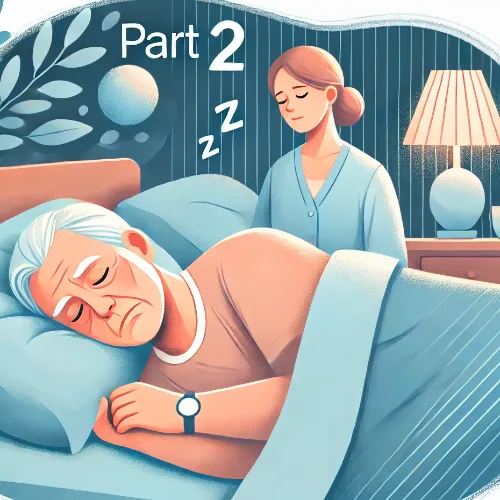
If you’re reading this, chances are you’re exhausted. Caring for a dementia patient with sleep issues is physically and emotionally draining.
But here’s the good news: small, simple changes can improve their sleep - and yours.
Here are 7 science-backed ways to help your loved one sleep better.
Dementia patients thrive on routine. Their brain may no longer regulate sleep naturally, but a
structured schedule can help.
✓ Set a fixed bedtime and wake-up time - even on weekends.
✓ Wake them up at the same time daily (no letting them “sleep in”)
This helps train their brain to expect sleep at the same time every night.
Natural light is a powerful sleep regulator. It signals to the brain that it’s daytime, helping reset the internal clock.
✓ Get morning sunlight exposure - sit outside or near a window for 30 minutes
✓ Keep lights dim in the evening to prepare for sleep.
Sunlight therapy has been shown to reduce sundowning symptoms and improve sleep quality.
Stimulants make sleep problems worse. Dementia patients are especially sensitive to:
+ Caffeine (coffee, tea, chocolate)
+ Sugary foods (especially in the evening)
+ Heavy, greasy meals before bedtime
✓ Encourage light, nutritious dinners
✓ Offer herbal tea or warm milk instead of coffee.
Dementia patients often feel disoriented at night, leading to restlessness. A calming environment can make a big difference.
✓ Use nightlights to prevent fear in the dark
✓ Remove mirrors (some patients get frightened by their reflection)
✓ Reduce noise and distractions—use white noise machines if needed.
Too much inactivity leads to pent-up energy, making it harder to sleep.
✓ Encourage light exercise like walking or stretching
✓ Engage them in simple activities (folding laundry, gardening, music)
✓ Avoid intense activities close to bedtime
Exercise has been proven to improve sleep and reduce agitation in dementia patients.
Familiar bedtime routines can signal the brain that it’s time to sleep.
✓ Read a favorite book or poem
✓ Offer a gentle hand massage or warm bath
Repetitive, calming activities help reduce nighttime anxiety.
Dementia patients often wake up confused and frightened. How you respond can determine whether they settle down - or become more agitated.
✓ Stay calm and reassuring —use a soft voice
✓ Don’t argue if they think it’s morning — instead, gently guide them back to bed
✓ Keep a familiar object nearby — a favorite blanket or stuffed toy can be comforting
If they remain restless, avoid forcing them to sleep. Instead, engage them in a quiet, low- stimulation activity like listening to soft music.
If sleep problems persist despite lifestyle changes, consult a doctor. Medication is rarely the best solution, but a professional can:
✓ Check for underlying medical conditions
✓ Review medications that may be affecting sleep
✓ Recommend non-drug interventions
At Vazhikatti Mental Health Centre, our Dementia Assessment & Management Solutions (DAMS) programme helps families create personalized care strategies, including sleep management.
To learn how DAMS can help, contact Vazhikatti Mental Health Centre at 75075 50050.
Better sleep is possible. With the right approach, you and your loved one can experience more restful nights.